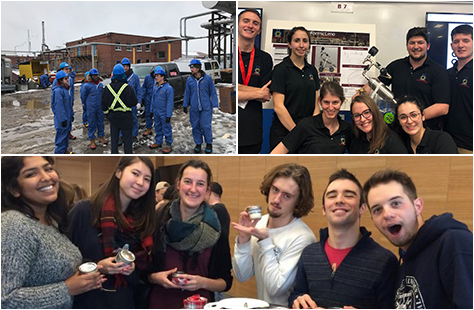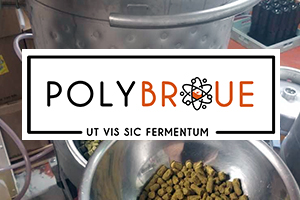Our students' showcase is an opportunity to recognize and share the achievements of our students, both academic and social. Student life is an important part of the department, and we are proud to present this facet of chemical engineering.

In addition to enabling the active integration of theoretical concepts seen in the classroom, comprehensive projects offer students the opportunity to work in a team on concrete engineering projects, to acquire a methodology for solving problems and to learn more about chemical engineering. Students also develop several skills that will be useful in the workplace, such as teamwork, creativity, and written and oral communication.

PRINT YOUR FACTORY
EXAMPLES OF PROJECTS
- Recovery and valorization of ocean plastics
- CO2 capture and valorization
- Isopropyl alcohol of pharmaceutical grade production
- Valorization of biogas from a composting site
As part of the GCH1140 — Team Work and Chemical Engineering Project course, first-year students have to analyze, as a team, a process of their choosing, in order to create different plans, a 3D simulation of their factory, a 3D printed model, an economic analysis and a sustainable development analysis.
1. TEAM Thorin - Steel production process
The members of this team are: Sacha Dorval, Rosalie Gauthier, Claudia
Laverdière, Nancy Nleme and Alexandre Warin.
2. TEAM Génivert - Sanitary pad Production Process
The members of this team are: Gabrielle Lacroix, Sarra Soussou, Noémy
Gagnon-Lafrenais and Nour Lamis Siaf.
3. TEAM Fabriken Machen - Aluminum recycling process
As part of the GCH2550 — Digital Modelling Project, second-year students are expected to model a large-scale industrial process in a team, incorporating the principles of sustainable development. To achieve this, they must produce a detailed plan of the plant, a material and energy balance simulator and a simulator of equipment operated under transient conditions.
EXAMPLES OF PROJECTS
- Valorization of a paper-making process' residual materials
- Revalorization of a sugar production process from sugar beet
- Revalorization of the production process of PVC-C, a material used in pipes manufacturing
As part of the course GCH3100C — Unit Operations Projects, third-year students are required to design an industrial process’s equipment, based on specifications provided by a client. This project, realized in teams of 8, gives students the opportunity to consolidate their project management skills by incorporating management and organizational challenges. Students must also evaluate the impacts of the process they are designing, in terms of sustainable development and they must suggest innovative ideas to improve it.
EXAMPLES OF PROJECTS
- Design basis of a liquid fuel production unit by conversion of sorted household waste
- Design basis of an ethylene production unit by dehydration of biosourced ethanol
- Design basis of a distillation unit for the production of oxygen, nitrogen and argon
The fourth comprehensive project is done over two semesters, covering the courses GCH8271 — Process Design and Synthesis and GCH8272 — Design and Impact Analysis Project. Students are asked to design a whole process in teams of 4 to 6 people, in partnership with an industrial client. Teams must prepare a service offer, a technological review to determine which unit operations and related equipment will be needed to achieve the design objectives, a detailed design plan, an in-depth technical-economic study to evaluate the project’s cost effectiveness, an evaluation of the process itself as well as a risk analysis and finally, make recommendations for the customer. This project allows students to synthesize, integrate and use the know-how (and the soft skills) that they acquired and developed during their training.
EXAMPLES OF PROJECTS
- Revalorization and purification of graphite from lithium ion batteries (with Seneca)
- Design of a beer-brewing pilot unit (with Laporte / Horeca)
- Mobile unit for the production of dimethyl ether from natural gas (with GasTechno)
- Recycling and valorization of concrete sludge (with CRH)
- Debromination of electronic waste (with Groupe Lavergne)
- Atmospheric water capture process (with Awn Nanotech)
- Production of 2.5-Furandicarboxylic Acid (FDCA) from glucose (winning project at the Hatch design competition offered by the Canadian Society for Chemical Engineering, October 2017).
Our students regularly receive awards and recognition for their scientific excellence, their engagement and/or their projects. The Chemical Engineering Department is proud to highlight their achievements, which testify to the quality of the training they receive at Polytechnique.
| Undegraduate Level |
|
2025
2024
|
| Graduate Level |
|
2025
2024
|
| Undergraduate Level |
|
2024-2025
|
| Graduate Level |
|
2024-2025
2023-2024
|
Manuel Blais, Malika Dupuis, Emmanuelle Nadeau, and Alexandre Warin organized the first Québec Chemical Engineering Competition in 2025.
This event brought together students from Polytechnique Montréal, McGill, Sherbrooke, and Laval universities for a weekend-long competition simulating the annual cycle of a real company.Case studies were prepared by various industry partners, and the event was a great success.
The Chemical Engineering Department sponsors two technical teams at Polytechnique Montréal. Technical teams are open to students from all programs and allow them to deepen, implement and enrich their knowledge while participating in national and international competitions.
|
This technical team promotes technological development in the brewing industry. The company participates in the Polytechnique event Les Houblonneries and in various beer competitions. |
Polytechnique Montréal encourages entrepreneurial spirit and supports students interested in entrepreneurship, notably through Propolys, the incubator for technology entrepreneurs. Propolys offers business creation support services and contributes to the development of entrepreneurial skills. Visit this page to learn more ...
-
Léanne Bégin, an undergraduate student in chemical engineering, is one of the co-founders of New Grounds, a company that has developed a local and sustainable solution integrating materials derived from organic waste to partially replace sand in concrete.
-
Jérôme Allard, who holds a bachelor's degree in chemical engineering and is currently a PhD student in biomedical engineering at Polytechnique Montréal, is one of the founding members of Breaking Bone, alongside Professors Géraldine Merle and Daria Boffito. The company aims to develop new treatments for subchondral bone diseases.
-
Fiona Milano, a PhD student in biomedical engineering under the supervision of Professors Marc Lavertu and Gregory De Crescenzo, is one of the founding members of Phoenix Impact, a company focused on reducing plastic use in life sciences research laboratories.
-
Mohammad Kodabandelhoo, who holds a PhD in chemical engineering, founded Hydrovel, a company developing negative-emission processes to produce clean hydrogen and value-added chemicals.
- Jocelyn Doucet and Jean-Philippe Laviolette, both graduates in Chemical Engineering, founded Pyrowave, a company that transforms plastic into raw material using an innovative process. Pyrowave won the Genie Innovation Award from the Ordre des Ingénieurs du Québec in 2018.
- Nury Ardila and Mounia Arkoun, who hold a Ph.D. in Chemical Engineering, created the company Evio Inc., which produces an active food packaging based on chitosan that extends the shelf life of foods by curbing bacterial growth.
- Mohamed Khalil, Ph.D student in Chemical Engineering, is the president and founder of the company Pyrocycle, which proposes a new non-polluting and profitable process for recycling electronic waste. His company has won numerous awards, including the Clean50—Top Projects in Canada in 2019.






 Polybroue
Polybroue
